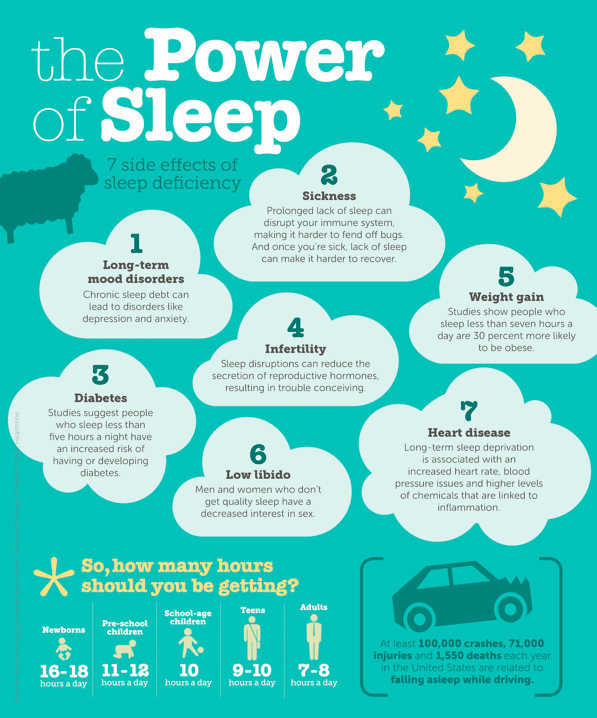Did you know that sleep plays a key role in our daily functioning? It is a fascinating phenomenon that is an inseparable part of our lives. Dreams help us rest, regenerate and consolidate our experiences. In this page, we will look at the role of sleep and how it affects our health and well-being.
Contents:
- Why is sleep important?
- Sleep phases
- The benefits of sleep
- Sleep related disorders.
WHY IS SLEEP IMPORTANT?

Sleep is not only a time of rest for our body, but also an extremely important process for the proper functioning of our brain. While we sleep, our brain processes information, consolidates memory, and repairs cells. Lack of adequate sleep can lead to many negative effects, such as impaired concentration, decreased intellectual performance, problems with emotions and mood.
SLEEP PHASES:
Basically, sleep consists of two main phases: NREM (non rapid eye movement) and REM (rapid eye movement). NREM – phase of slow eye movements. The NREM phase (slow-wave sleep) lasts about 80 to even 100 minutes. It consists of three stages:
N1: Falling asleep – occurs at the beginning of the NREM phase. Normally, we should go to sleep within 15 to 20 minutes. When you fall asleep, your heart rate slows down, your muscles relax and your body temperature drops. We slowly stop responding to external stimuli. There may also be a characteristic feeling of falling, floating or “spinning around”. In this stage, there are slow eye movements and theta waves dominate the brain.
N2: Light sleep – during it there is a gradual disappearance of eye movements and we completely “switch off” to external stimuli. Muscle tension is at its lowest at this point, and the brain begins to produce sleep spindles and K-complexes to protect against waking up.
N3: Deep sleep – in the stage of deep sleep, slow delta waves and dreams appear in the brain. This is the last stage of the NREM phase. Eye movement disappears completely, but involuntary body movements may occur. Some people sleepwalk while in deep sleep, from which it is the hardest to wake up. This stage is responsible for regeneration and obtaining energy, as the blood flow is directed mainly to the muscles that remain relaxed.
REM – rapid eye movements (the last stage of the sleep cycle). During it, the brain shows the highest activity, and at the same time we dream most often. Interestingly, despite the numerous processes taking place in the brain, our body remains completely immobile. The phase of rapid eye movements is much shorter than its predecessor and lasts about 15 minutes.
The REM phase is responsible for clearing our brain of emotions, and also helps to maintain the consistency of physiological and mental reactions.
The benefits of sleep

Regular and sufficient sleep brings many benefits to our health and mental well-being. Here are some of the main benefits of a good night’s sleep:
- Improvement of concentration and cognitive performance.
- Strengthening memory and remembering ability.
- Mood and emotion regulation.
- Increased immunity of the body and better functioning of the immune system.
- Reducing the risk of heart disease and other health problems.
- Better stress management and greater resilience to everyday challenges.
SLEEP-RELATED DISEASES
SLEEP DISORDER IS A SERIOUS AFFECT THAT AFFECTS THE HEALTH OF THE WHOLE BODY. THE TERM HAS A GROUP OF DISEASES THAT AFFECT OUR ABILITY TO GET EFFICIENT NIGHT REST.
Sleep-related disorders:
- Shallow sleep: Scientists have not clearly defined where it comes from and what it means. Undiagnosed sleep disorders, lifestyle, genetics, and brainwave activity during sleep have all been implicated as contributing to this type of problem.
- Nightmares: Nightmares are disturbing or terrifying dream visions. Occasionally, they happen to every second adult. The problem arises when nightmares recur and disrupt our functioning. Nightmares evoke similar emotions after waking up – fear, sadness, guilt, anxiety. Racing thoughts and general anxiety make it difficult to fall back to sleep.
- Insomnia: Insomnia is one of the most common sleep disorders, characterized by difficulty falling asleep, staying asleep, or poor sleep quality. The effects of insomnia can include excessive daytime sleepiness, trouble concentrating, depressed mood, and an overall deterioration in quality of life. It also affects the functioning of the immune system, increasing susceptibility to infections.
- Narcolepsy: Narcolepsy is a condition characterized by a sudden and irresistible need to sleep during the day, often leading to uncontrollable episodes of napping. People with narcolepsy may also experience a loss of muscle tone, leading to a sudden loss of strength in the muscles known as catalepsy. Narcolepsy significantly limits daily functioning and can lead to dangerous situations, such as having breakfast while driving.
- Sleep apnea: Sleep apnea is a condition where a person experiences repeated pauses in breathing while sleeping. The most common form of sleep apnea is obstructive sleep apnea, which results from blockage of the airway by the muscles of the throat. The effects of sleep apnea can include loud snoring, frequent awakenings, excessive daytime sleepiness, and an increased risk of cardiovascular disease.
- Restless Legs Syndrome: Restless Legs Syndrome is a condition characterized by an irresistible urge to move the legs, usually associated with an unpleasant tingling or discomfort sensation. Symptoms of Restless Legs Syndrome mainly occur during rest and sleep, leading to difficulty falling asleep and sleep disturbance. Sleep disturbances resulting from this condition can lead to excessive fatigue and reduced quality of life.


